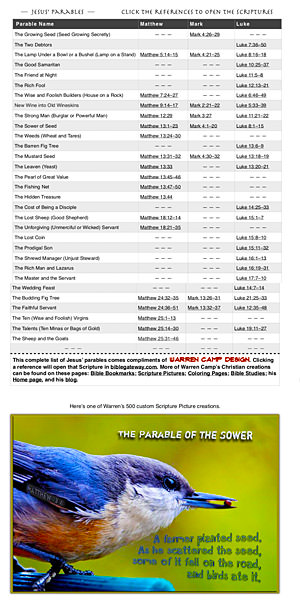
Jesus told this parable while he was near Jerusalem, because his disciples thought that the kingdom of God would appear immediately. The objective of investing during the master’s absence was intended to counter expectations of the immediate appearance of God’s kingdom.

† Find Warren’s short summary at the bottom of page.

Click the list or the “bird” to enlarge and use Warren’s list of forty-four of Jesus’ parables (a PDF file with links to Scriptures).
Start Reading Warren’s Commentary . . .
Find his summary at the bottom.
par•a•ble [noun] a simple story used to illustrate the meaning of or a moral or spiritual lesson, as told by Jesus in the gospels
synonyms: allegory, moral story/tale, fable
Jesus’ Parable of the Ten Minas
Luke 19:11–27
The Parable of the Ten Minas — found in Luke’s gospel — is often assumed to be the same parable found in Matthew’s gospel (Matthew 25:14–30), titled the Parable of the Bags of Gold (or Talents). In actuality, they’re two different parables. Although both parables deal with wise stewardship, when we realize the context in which Jesus spoke each, we need to distinguish the two as unique stories that Jesus told in different locations, to different people, for different reasons. See here why these are two different parables.
Having distinguished the two, I’ve included my summary of the Parable of the Ten Minas within my collection of the ten “God’s Kingdom” parables, while putting my summary of the Parable of the Bags of Gold in the “Judgment” category. (See in which categories in the parables list each one appears: Warren’s “Parables of Jesus” page.)
Jesus used his Parable of the Ten Minas to teach about how and when the kingdom of God was to appear on earth. He spoke this parable on his final trip to Jerusalem. Ironically, many people in the crowd who’d followed and become attracted to him believed that he was walking to Jerusalem in preparation for his immediate establishment of his kingdom. Instead, he was going there to die, as he’d recently announced to the Twelve — his apostles (see Luke 18:31–33). Jesus used this parable to dispel the hopeful-yet-mistaken supposition that the time for God’s kingdom to arrive was at hand.
This animated video comes compliments of CCO Youth
The Parable of the Ten Minas — Luke 19:11–27
This parable provides the key to understanding what our lives in Christ should be about. We’re here on earth to become wise stewards of all the worldly treasures that Jesus — the Provider we call Jehovah Jireh — has entrusted to us. But at the same time, we’re here to prepare for our life in the age to come, which is God’s kingdoms of heaven and the new earth. Today, we ought to begin every day understanding both concepts. That’s the purpose of this crucial, instructional parable.
As Jesus approached Jerusalem, days before his crucifixion, he detected the crowd’s expectation of an imminent appearance of the kingdom of God that he’d been promoting and promising. He knew very well that God’s kingdom wasn’t soon to appear. So to prepare them (and his followers through the ages) for that revelation, he introduced to every one of those listening to him a fictional nobleman who’d star in Jesus’ next parable. The nobleman would travel far away to a distant country “to have himself appointed king and then to return.” In this story, Christ presents himself as the nobleman, while the “distant country” is the kingdom of God, over which he’ll reign after he returns to earth.
The Parable of the Ten Minas
11While they were listening to this, he went on to tell them a parable, because he was near Jerusalem and the people thought that the kingdom of God was going to appear at once. 12He said: “A man of noble birth went to a distant country to have himself appointed king and then to return. 13So he called ten of his servants and gave them ten minas. ‘Put this money to work,’ he said, ‘until I come back’” (Luke 19:11–13).
Before the nobleman departed for the distant country to be made king, he gave one mina to ten of his servants (vv. 12–13), instructing them to “Put this money to work.” The term “minas” refers to substantial sums of money in the culture of that day; one mina amounted to approximately 100 days' wages while ten minas amounted to approximately three years’ wages. One lesson we’re to learn from this parable is that while God generously gives us things of considerable value, he fully expects us, as recipients of his provisions, to act wisely in our stewardship of them, such that we attain an appreciable return on what he’s provided. A second lesson is this: Christ speaks here about money, but he’s really talking about something far more important: the element of spiritual character.
The money or mina is only the conduit that he uses to teach a far greater lesson. At the end of the day, more than anything else, Christ is interested in what we do with our spiritual “minas.”
Jesus advises his readers herein that this physical life we currently live serves to prepare us well for something far greater than what we see, feel, and do today. Our life now is meant to prepare us for our upcoming role and participation in the coming kingdom of God. How we live and use our “minas” — the gifts, resources, aptitudes, and opportunities that we’ve been given — is critical.
The parable’s plot thickens when Jesus tells us next that the subjects of the nobleman who’d return as king “hated him” and sent word to him that they refused to acknowledge his kingship. Those who refused to work for the king while he was away were actually saying that they didn’t want him to be their king.
14“But his subjects hated him and sent a delegation after him to say, ‘We don’t want this man to be our king’” (v. 14).
Interestingly, when the nobleman was crowned king, he returned to his homeland and began to make things right, by first calling in the ten servants to whom he’d loaned one mina. Each servant gave an account as to how he’d used the king’s money.
15“He was made king, however, and returned home. Then he sent for the servants to whom he had given the money, in order to find out what they had gained with it.
16“The first one came and said, ‘Sir, your mina has earned ten more.’
17“‘Well done, my good servant!’ his master replied. ‘Because you have been trustworthy in a very small matter, take charge of ten cities.’
18“The second came and said, ‘Sir, your mina has earned five more.’
19“His master answered, ‘You take charge of five cities’” (vv. 15–19).
In v. 15, the story zooms in to the future with the return of the nobleman-turned-king and an accounting of the disbursed funds “to find out what they had gained with it.” Jesus tells three people’s stories. One gained tenfold and another fivefold. They were diligent servants who accepted what was given, worked hard with their investment, and gained an increase. Their reward is described as being put in charge of or ruling over cities in the age to come.
The first servant showed that his mina had earned ten more. The king was pleased, saying, “Well done, my good servant! . . . Because you have been trustworthy in a very small matter, take charge of ten cities” (v. 17). The next servant’s investment yielded five additional minas for which that servant was rewarded with having been given full charge of five cities (vv. 18–19).
Next, Jesus tells us of the servant who reported that he hadn’t done anything with his mina except to hide it in a cloth.
20“Then another servant came and said, ‘Sir, here is your mina; I have kept it laid away in a piece of cloth. 21I was afraid of you, because you are a hard man. You take out what you did not put in and reap what you did not sow.’
22“His master replied, ‘I will judge you by your own words, you wicked servant! You knew, did you, that I am a hard man, taking out what I did not put in, and reaping what I did not sow? 23Why then didn’t you put my money on deposit, so that when I came back, I could have collected it with interest?’
24“Then he said to those standing by, ‘Take his mina away from him and give it to the one who has ten minas.’
25“‘Sir,’ they said, ‘he already has ten!’
26“He replied, ‘I tell you that to everyone who has, more will be given, but as for the one who has nothing, even what they have will be taken away’” (vv. 20–26).
The servant reasoned that he hid his mina because he was afraid of the nobleman who he felt was a stern businessman who gained from the work done by others. The king responded to the servant’s “hard man” critique by demonstrating his own hardness, calling him a “wicked servant” and ordering bystanders to take that mina from him and give it to the one who’d earned ten (vv. 22, 24). When some bystanders said surprisingly, “Sir . . . he already has ten!” the king replied, “I tell you that to everyone who has, more will be given, but as for the one who has nothing, even what they have will be taken away” (vv. 25–26).
In closing, Jesus told those listening to this parable that the king gave this command to his enemies — those who’d rebelled against his authority: “But those enemies of mine who did not want me to be king over them — bring them here and kill them in front of me.” So, there, in the king’s presence, they were executed (v. 27).
So, Who’s Who in This Parable?
It ought to be evident that the nobleman is Jesus; he left this world but he’ll return one day to become its King.
The servants whom the king charges with a specific task represent followers of Jesus. We should realize from this parable that the Lord has given us a valuable commission! We must accept it and faithfully serve him until he returns, when he’ll ascertain the faithfulness of his followers. There’s work to be done continually by us, his servants, and we must act wisely in using those resources and provisions that God has given us so we’ll most appropriately glorify him. As such, promised rewards will be received by all those servants who actively remain faithful in maximizing the returns of their investments.
The enemies who rejected the king represent the people of the Jewish nation who rejected Christ while he walked and taught on earth, and of course everyone who denies his kingship today. When Jesus returns to establish his future kingdom, one of the first things he’ll do is completely defeat/kill/execute/slay his enemies (Revelation 19:11–15).
God has blessed you and me with the gift of life, which comes with an obligation to serve him. Through the always available assistance of the ever-present Holy Spirit, he guides and guards what we do, as do the pages of Scripture, which provide a priceless understanding of essential eternal truths. And God offers us rewards, so long as we’re willing to put into practice and invest the “spiritual minas” that he provides continuously.
Make a commitment today to use your life as God intends for you; use it initially in your preparation period, as a training ground for the upcoming, future kingdom of God. Focus on those spiritual qualities of life that you can invest in successfully as you await the glorious future that God has prepared for you.
The Point of the Parable
The two-part lesson in this story is that (1) God has provided all of us with one or more resources in our lives that he expects us to use well, wisely, and effectively; in turn, (2) he expects us to manage or invest them so that they’ll increase. We’re obligated to be active with our investment of his God-given resources. The slothful servant who hid his mina in a cloth lost entirely what he’d been given because he chose not to use or invest it.
On judgment day, we’ll be evaluated individually, by God, on what we’ll have done in this kingdom of his, on earth, with all of what he’s given us. We don’t like to hear about a “judgment.” Our modern minds aren’t conditioned to think that our actions and thoughts are known to God and that, one day, we’ll stand before him to present our personal account.
Those who do God’s work will be rewarded accordingly, whereas those who don’t will receive severe consequences.
Jesus brings up to us several things in this Parable of Ten Minas about “the future kingdom of God,” which is to be characterized by peace, justice, unity, abundance, righteousness, joy, and the lasting presence of Christ, when God and his people will live forever, in the new Jerusalem, on a new earth, with a new heaven (Rev. 21). He also reveals conditions about the time leading up to it. As v. 11 indicates, Jesus’ most basic point is that his future kingdom wasn’t going to appear immediately; there’d be a period of time during which the king would be absent, prior to the new kingdom’s creation. May we be wise investors of his provisions while we await his return.
Question 1 What talents and resources do you think Jesus has left with you? Have you made a hearty effort to invest them well?
Question 2 Is fear or alarm ever a motive in your relationship with Christ? How so?
“But those enemies of mine who did not want me to be king over them — bring them here and kill them in front of me” (Luke 19:27b).

Take our “Parables Quiz.”
See Warren’s other “Parables of Jesus” commentaries.
— Warren’s Concise Summary —
In the Parable of the Ten Minas (Luke 19:11–27), Jesus tells of a nobleman who departs to receive a kingdom, leaving ten servants with a mina each, instructing them to do business until his return.
While two servants invest their minas and multiply them — earning the nobleman’s praise and substantial rewards — the third servant simply hides his mina out of fear. He is rebuked, losing even what he had.
Finally, the king orders severe judgment on subjects who opposed his rule. The parable teaches about the necessity of faithful stewardship and accountability, warning that opportunities given by God must be used productively, and that rejection of the king brings destruction.
